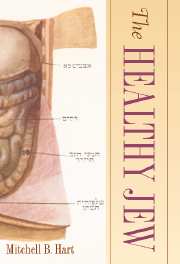Book contents
- Frontmatter
- Contents
- Preface and Acknowledgments
- THE HEALTHY JEW
- Introduction: “Links in a Long Chain”: Jews, Judaism, Health, and Hygiene
- 1 “'Tis a Little People, But It Has Done Great Things”: The Role of Health and Medicine in Modern Jewish Apologetics
- 2 Moses the Microbiologist: Alfred Nossig's The Social Hygiene of the Jews
- 3 Healthy Hebrews, Healthy Jews: The Bible as a Sanitary Code in Anglo-American Medical Literature
- 4 From Ghetto to Jungle: Darwinism, Eugenics, and the Reinterpretation of Jewish History
- 5 TB or Not TB, That Was a Jewish Question: Moses, Kashrut, and the Prevention of Tuberculosis
- 6 “Then What Advantage Does the Jew Have?”: Judaism as a Model for Christian Health
- 7 Conclusion
- Notes
- Bibliography
- Index
6 - “Then What Advantage Does the Jew Have?”: Judaism as a Model for Christian Health
Published online by Cambridge University Press: 18 July 2009
- Frontmatter
- Contents
- Preface and Acknowledgments
- THE HEALTHY JEW
- Introduction: “Links in a Long Chain”: Jews, Judaism, Health, and Hygiene
- 1 “'Tis a Little People, But It Has Done Great Things”: The Role of Health and Medicine in Modern Jewish Apologetics
- 2 Moses the Microbiologist: Alfred Nossig's The Social Hygiene of the Jews
- 3 Healthy Hebrews, Healthy Jews: The Bible as a Sanitary Code in Anglo-American Medical Literature
- 4 From Ghetto to Jungle: Darwinism, Eugenics, and the Reinterpretation of Jewish History
- 5 TB or Not TB, That Was a Jewish Question: Moses, Kashrut, and the Prevention of Tuberculosis
- 6 “Then What Advantage Does the Jew Have?”: Judaism as a Model for Christian Health
- 7 Conclusion
- Notes
- Bibliography
- Index
Summary
“In the Greeks alone we find the ideal of what we should like to be,” Wilhelm von Humboldt wrote in his essay Über das Studium des Altertums und des Greicheschen inbesondere (1793). By the late eighteenth century at the latest, ancient Greece, for better or worse, was regarded by many as the ideal and model for European culture. At the same time, as is well known, there were others who insisted that the worship of all things ancient and Greek was misplaced, that modernity was superior to the ancient past, and that modern Europeans would do well to reject the idealization of the ancients. Progress, in the view of the moderns, was linear, and for the most part those who lived now were better off than their ancestors. Were these the only two models offered an educated public interested in the relationship between the ancient and the modern, and the questions of knowledge, well-being, and progress?
As I've tried to show in this book, over the course of the nineteenth century an intellectual tradition developed that reinterpreted the Mosaic and rabbinic law codes as medical hygiene codes. Physicians, rabbis, professional and popular medical writers, and others working within this interpretive paradigm demonstrated the efficacy of the laws by pointing to the historical and contemporary vitality of the Jews, their longer individual life spans, their purported immunity from certain diseases, and their 3,000- year-long survival as a distinct race or Volk.
- Type
- Chapter
- Information
- The Healthy JewThe Symbiosis of Judaism and Modern Medicine, pp. 173 - 190Publisher: Cambridge University PressPrint publication year: 2007



